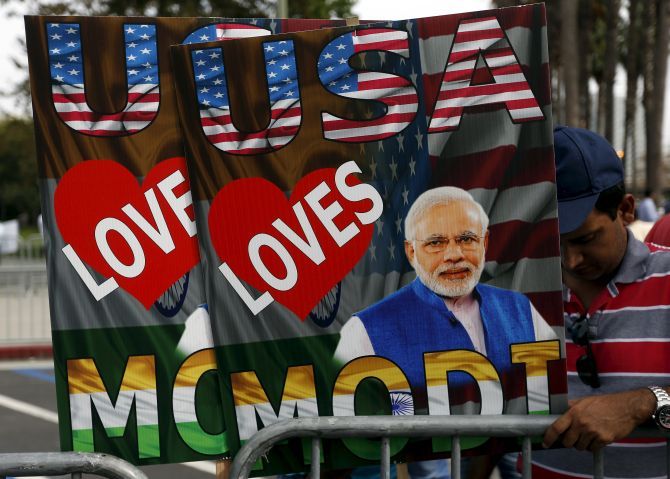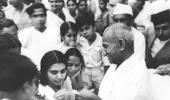'For all of the tamasha about these meetings of Modi and the videshi desis, the reality is that they are just entertainment.'
'The question to ask is what does this energy result in? The answer is: Not much,' says Aakar Patel.

This piece is about the Indians abroad whom we have seen so much of in the last 16 months. The ones who mob the prime minister, one of the most brilliant politicians of our time and one who has a following among desis abroad as no other leader before him.
On every visit he has been to outside India since becoming prime minister, he has been drowned in Indians. In China, in the United States, in the Gulf and elsewhere.
This mobbing of Narendra Modi is referred to in our media, in glowing terms, as a rock star's welcome. What does that mean? The frenzied following of rock stars comes essentially from their charisma. It does not come from their humanity or their higher qualities, but a fake heroism which is a creation of their public image.
It is a cosmetic and superficial love. It is not a thing to be desired in serious statesmen.
We are not discussing here the object of the adulation, but it is true that certain types of mannerism in speech and action by the leader produce this sort of primal response.
We cannot imagine Gandhi getting a rock star's response because he did not solicit it.
It is also a fleeting and impermanent sentiment, and rock stars and film stars have limited shelf life. For now let us leave it at that. The subject here is not Modi, but the Indian aboard who craves association with Modi and let us look at why he does so.
First and most important, Indians are more nationalistic than most other nations. We are quickly moved to tears by songs of the motherland. Indians settled for generations in the West still identify with India and will show up at sporting events to support the mother country even when playing against the host, their real home.
The second aspect is a sense of guilt. For instance in doctors and engineers who have been educated on subsidised fees in India but then have chosen to make money abroad. It is only natural for them to have done so, but the sense of guilt remains for many.
Attending an event like Modi's functions, where nationalism is in full cry, gives them the satisfaction that they are supporting India and assuages the hidden sentiment that they have in some sense abandoned it.
The third motivator for attending comes from a sense of inferiority. The sense of unity and purpose in that mob makes them feel more important than their lives actually are. Attending a large function of fellow Indian expatriates gives them a sense of belonging. Many are unable to integrate fully into the host society. Especially on the cultural side.
Take the Patels for instance. Why does the Patel prefer the motel business? We celebrate his achievements in dominating this particular sector but there is insufficient analysis of why he prefers this line of work.
I have many relatives who do it and can speak with some authority on the subject. The fact is that running motels does not require the Patel to engage much with Americans except across the cash counter. Behind him there is kadhi bubbling in the kitchen and the Ramayan being played on the television in the living room.
The Gujaratis abroad group together and have few friends of local extraction. Patels especially are happiest when meeting other Patels for one of their festivals and other such occasions, and happiest also when returning home to build their temples and touching base with their godmen.
This is true also of other communities, and a high energy gathering like Modi's is a natural place for them to gravitate towards.
The question to ask is what does this energy result in? The answer is: Not much. Like a rock star's exit when the concert is over, the gathering has lost its meaning and its unity.
For all of the tamasha about these meetings of Modi and the videshi desis, the reality is that they are just entertainment.
Aakar Patel is Executive Director, Amnesty International India. The views expressed are personal.
- You can read more of Aakar's columns here
IMAGE: A man holds a poster showing his love for Prime Minister Narendra Modi outside the SAP Centre in San Jose, September 27. Photograph: Stephen Lam/Reuters










